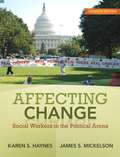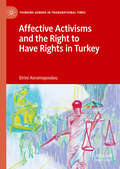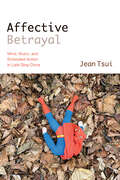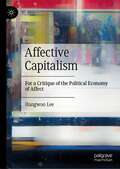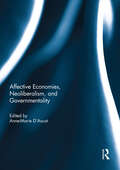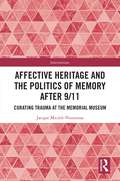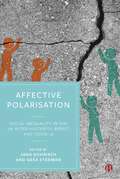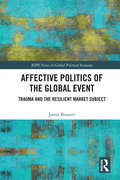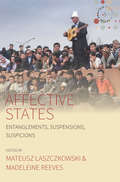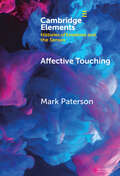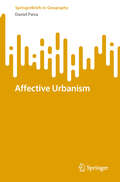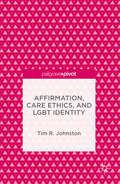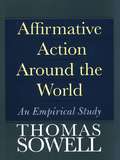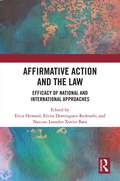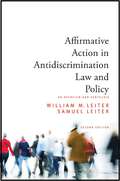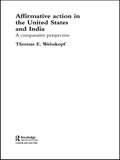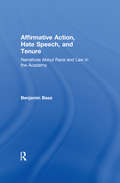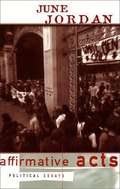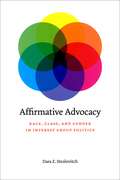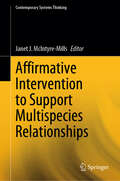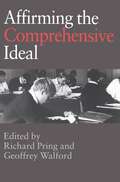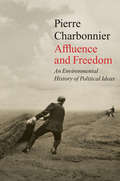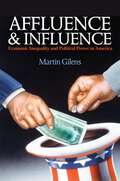- Table View
- List View
Affecting Change: Social Workers in the Political Arena
by Karen S. Haynes James S. MickelsonUpdated to reflect advances in a changing political arena of Obama's administration, this revision shows students how to develop political action skills and to take advantage of the opportunity of change. This practical, step-by-step guide focuses on advocacy as the central mission of social work practice. New material and 17 new personal scenarios involving social workers who have made a difference-senators, representatives, and officials in the political arena-serve to inspire students. Revised chapters show how social work skills can be most effective, whether by impacting the political arena as a social worker or running for office.
Affections: A Novel
by Rodrigo Hasbún Sophie HughesA haunting novel about an unusual family’s breakdown—set in South America during the time of Che Guevara and inspired by the life of Third Reich cinematographer Hans Ertl—from the literary star Jonathan Safran Foer calls, “a great writer.”Inspired by real events, Affections is the story of the eccentric, fascinating Ertl clan, headed by the egocentric and extraordinary Hans, once the cameraman for the Nazi propagandist Leni Riefenstahl. Shortly after the end of World War II, Hans and his family flee to Bolivia to start over. There, the ever-restless Hans decides to embark on an expedition in search of the fabled lost Inca city of Paitití, enlisting two of his daughters to join him on his outlandish quest into the depths of the Amazon, with disastrous consequences. Set against the backdrop of the both optimistic and violent 1950s and 1960s, Affections traces the Ertls’s slow and inevitable breakdown through the various erratic trajectories of each family member: Hans’s undertakings of colossal, foolhardy projects and his subsequent spectacular failures; his daughter Monika, heir to his adventurous spirit, who joins the Bolivian Marxist guerrillas and becomes known as “Che Guevara’s avenger”; and his wife and two younger sisters left to pick up the pieces in their wake. In this short but powerful work, Hasbún weaves a masterfully layered tale of how a family’s voyage of discovery ends up eroding the affections that once held it together.
Affective Activisms and the Right to Have Rights in Turkey (Thinking Gender in Transnational Times)
by Eirini AvramopoulouThis book presents a novel approach to the study of contemporary social movements and activism. Based on extensive ethnographic research of the life and politics of feminist, LGBTQI+, and women’s religious groups in Istanbul from 2007 to 2015, it explores the affects, meanings, and interpretations these groups express in their activism—in particular, their strategic use of human rights’ language to claim institutional and social legitimacy and their reinterpretation of gender/queer theory across politics of difference to make sense of global dynamics that affect their everyday lives. Chapters interweave personal accounts and life histories of individual activists with specific historical events to demonstrate the activists’ dissidence regarding the conditions that have defined their differently marginalised positions in Turkey and the significance of the formation of unexpected alliances. The ambivalent, yet inescapable, bargaining tool of rights is analysed as a demand over affective democratic visions, citizenship and a life worth living, and thus the right to have rights, as it is argued, pushes us to reflect on how power works when the political and affective surplus value invested in the need to rethink of rights (even beyond human rights themselves) lies both in the search for ways of institutionalising and implementing rightful demands, as well as in outlining more affective visions of political resistance. By arguing that activism is a performative and affective language that is defined by intersectional hopes, desires and dreams, as much as it engages with legal battles that define who or what might appear as being broken under specific historical and social settings, Affective Activisms employs gender and sexuality as analytical tools to make sense of local and transnational politics of resistance in the face of the re-emergence of authoritarian regimes, sexual harassment, gender violence, homo/trans phobia, and Islamophobia in Turkey and worldwide. It will be of interest to students and scholars across the fields of women's, gender and sexuality studies, queer theory, critical human rights and political theory, sociology, and social anthropology.
Affective Betrayal: Mind, Music, and Embodied Action in Late Qing China (SUNY series in Chinese Philosophy and Culture)
by Jean TsuiAffective Betrayal uses "affect" as an analytical category to explicate the fragility and fragmentation of Chinese political modernity. In so doing, the book uncovers some of the unresolved moral and philosophical obstacles China encountered in the past, as well as the cultural predicament the country faces at present.At the turn of the twentieth century, China's leading reformer Liang Qichao (1873–1929) presented modern political knowledge in musical and visual representational formats that were designed to stimulate readers' bodily senses. By expanding the reception of textual knowledge from "reading" to "listening" and "visualizing experiences," Liang generated an epistemic shift, and perhaps an all-inclusive internal intellectual, philosophical, and moral transition, alongside China's modern political reform. By tracing the marginalized academic and philosophical positions Liang sought to restore in China's incipient democratic movement, Affective Betrayal examines how his attempts to conjoin Confucian morality and liberal democracy expose hidden anxieties as well as inherent contradictions between these two systems of thought. These conflicts, besides disrupting the stability of China's burgeoning modern political order, explain why the import of modern concepts led to China's continued political impasse, rather than rationality and progress, after the 1911 revolution.
Affective Capitalism: For a Critique of the Political Economy of Affect
by Hangwoo LeeDrawing on Tarde's and Deleuze’s monadology, this book investigates the affective turn of contemporary capitalism. The concept of affect provides critical insight to overcome the limitations of social constructivism and cognitive capitalism. Affective capitalism transforms the population’s everyday bodily experiences into quantitative metrics that can be observed, measured, and processed on a non-conscious register, turning them into dividuals prepared to react and be affected by specific information at a given moment. In an era where social wealth increasingly relies on the 'social factory,' algorithms and big data constitute the living labor beyond employment. This book argues that affect also holds a potential for dismantling today’s real subsumption of life by capital. The network effect, mostly actualized as a company's market capitalization, is constantly traversed by the molecular becoming of affect, leading to new assemblages, such as free software movement, decentralized platforms, peer-to-peer networking, blockchain, and universal basic income.
Affective Communities in World Politics
by Emma HutchisonEmotions underpin how political communities are formed and function. Nowhere is this more pronounced than in times of trauma. The emotions associated with suffering caused by war, terrorism, natural disasters, famine and poverty can play a pivotal role in shaping communities and orientating their politics. This book investigates how 'affective communities' emerge after trauma. Drawing on several case studies and an unusually broad set of interdisciplinary sources, it examines the role played by representations, from media images to historical narratives and political speeches. Representations of traumatic events are crucial because they generate socially embedded emotional meanings which, in turn, enable direct victims and distant witnesses to share the injury, as well as the associated loss, in a manner that affirms a particular notion of collective identity. While ensuing political orders often re-establish old patterns, traumatic events can also generate new 'emotional cultures' that genuinely transform national and transnational communities.
Affective Economies, Neoliberalism, and Governmentality
by Anne-Marie D’AoustAdvanced capitalism is characterized by a level of symbolic production that not only results in a dematerialization of labor, but also increasingly relies on highly emotional components, ranging from consumption desire to workforce management. Feelings as varied as love, anger, and desire are integral to neoliberal processes, though not in unproblematic and monolithic ways. Whereas some accounts decry capitalism’s hold on the emotional realm, as the commodified search for soul mates through online dating sites or Starbucks’ promotion of fair-trade coffee suggest, others counter that emotions represent a privileged site of resistance to market rationality. Relying on different case studies ranging from drone strikes, the 2008 economic crisis in Ireland, and marriage migration management, this volume builds on this productive tension between subjection and resistance through the lenses of the concept of governmentality. Developed by Michel Foucault, governmentality sheds light on the ways in which economic and political life are now being managed through logics of security and economic calculations. This volume explores how individuals might become emotionally attached to regimes of power that are detrimental to them, how neoliberal processes are concomitant with the valorization of certain emotional dispositions, and how affective economies might provide a site of resistance. This book was published as a special issue of Global Society.
Affective Heritage and the Politics of Memory after 9/11: Curating Trauma at the Memorial Museum (Interventions)
by Jacque Micieli-VoutsinasThis book critically examines the institutional curation of traumatic memory at the 9/11 Memorial Museum and its evocative power as a cultural storyteller. Memorial Museums are evocative spaces. Drawing on aesthetic practices deeply rooted in representing the ‘unrepresentability’ of cultural trauma, most notably the Holocaust, Memorial Museums are powerful, popular mediums for establishing cultural values, asking the visitor to contemplate "Who am I?" in relation to the difficult histories on display. Using primary data, this book poses important questions about the emotionally-charged site: what ‘moral lessons’ are visitors imparted with at the 9/11 Memorial Museum? Who is the cultural institution’s primary audience—the imagined community it reconstructs this traumatic history and safeguards its memories for? What does the National September 11 Memorial & Museum ultimately teach visitors about history, ourselves, and others? This work will be of interest to students and scholars in the areas of Human Geography, American Studies, Museum Studies and Public History, Cultural and Heritage Studies, and Trauma and Memory Studies.
Affective Polarisation: Social Inequality in the UK after Austerity, Brexit and COVID-19
by Jana Gohrisch and Gesa StedmanInequality is an ever-present danger in our society. This important book addresses the crucial nexus between the lived experience of inequality and how it shapes political responses. With contributors from the UK and Continental Europe, the book compiles case studies with theoretically informed discussions of the relationship between affective polarisation, social inequality and the fall-out from Brexit and COVID-19. Using a broad concept of social inequality, the book incorporates aspects of economy and society, language, and emotion culture, as well as interviews and film in historical and transnational perspectives. The contributors offer a powerful examination of the ways in which the politics of the UK and the lived experiences of its residents have been reframed in the first decades of the 21st century.
Affective Politics of the Global Event: Trauma and the Resilient Market Subject (RIPE Series in Global Political Economy)
by James BrassettMarket life is increasingly conducted in the shadow of global events like 9/11, the Sub-Prime crisis and Brexit. Within International political economy (IPE) two broad positions can be discerned: either the event is ‘just an event’, a superficial spectacle in an otherwise straightforward story of power and hierarchy; or the event is large enough to be considered a ‘crisis’. While sympathetic to such arguments, this book develops a more performative politics of the global event, arguing that the very idea of the event must be placed in question. How is the event constructed? How are market subjects performed in relation to the event? This book argues that emotional and psychological discourses of ‘trauma’ and ‘resilience’ provide an important affective register for understanding how the global event is ‘known’, how it is governed, and how the affective dimensions of market life might be lived. By identifying the contingent rise of these discourses, the author de-stabilises and re-politicises the apparent existential veracity of the global event. The critical possibilities and limits of the affective turn in market life can then be rendered according to classic questions of IPE: who wins, who loses, and how might it be changed? An important work for advanced scholars and students of international political economy, ‘everyday and cultural political economy’, crisis and resilience, as well as broader debates on globalisation.
Affective States: Entanglements, Suspensions, Suspicions
by Madeleine Reeves Mateusz LaszczkowskiIn recent years, political and social theory has been transformed by the heterogeneous approaches to feeling and emotion jointly referred to as 'affect theory'. These range from psychological and social-constructivist approaches to emotion to feminist and post-human perspectives. Covering a wide spectrum of topics and ethnographic contexts-from engineering in the Andes to household rituals in rural China, from South African land restitution to migrant living in Moscow, and from elections in El Salvador to online and offline surveillance among political refugees from Uzbekistan and Eritrea-the chapters in this volume interrogate this 'affective turn' through the lens of fine-grained ethnographies of the state. The volume enhances the anthropological understanding of the various ways through which the state comes to be experienced as a visceral presence in social life.
Affective Touching: Neurobiology and Technological Applications (Elements in Histories of Emotions and the Senses)
by Mark PatersonAt the end of the twentieth century the discovery of 'slow', affective touch nerves in humans known as C Tactile (CT) afferents, which are entirely separate from the faster pathways for touching objects, had huge social implications. The Swedish neuroscientists responsible formulated an “affective touch hypothesis” or “social touch hypothesis” to consider their purpose. Part I offers a history of the science of social touch, from related discoveries in mammals by physiologists in the 1930s, to the recent rediscoveries of the CT nerves in humans. Part II considers how these findings are being intentionally folded into technologies for interaction. First, as mediated social touch, communicating at a distance through haptics. Second, with the increasing number of social and service robots in health care and domestic settings, the role of affective touch within human-robot interaction design.
Affective Urbanism (SpringerBriefs in Geography)
by Daniel PaivaThe book poses key questions on the contemporary practices of experience-oriented urbanism from the perspective of the affective turn. Departing from a critique of the imposition of the experience economy on contemporary urbanism, the book seeks alternative narratives and praxis for the co-creation of experiences in the city by looking at how different urban curators play with rhythms, atmospheres, and worlds to improve their communities. In this sense, the book offers practical pathways for urbanists interested in using experience co-creation as a tool for fostering communities and fulfilling the right to the city. The book is mainly targeted to researchers, postgraduate students, and practitioners. The topic of affective urbanism is of interest to scholars in urban studies, architecture, geography, anthropology, and sociology.
Affirmation, Care Ethics, and LGBT Identity
by Tim R. JohnstonIn this book, Johnston argues that affirmation is not only encouragement or support, but also the primary mechanism we use to form our identities and create safe spaces. Using the work of feminist care ethics and the thinking of French philosopher Henri Bergson to examine responses to school bullying and abuses faced by LGBT older adults, he provides the theoretical analysis and practical tools LGBT people and their allies need to make all spaces, public and private, spaces in which we can live openly as members of the LGBT community. With its combination of philosophical theory and on-the-ground activist experience, this text will be useful to anyone interested in philosophy, women's and gender studies, psychology, aging, geriatrics, and LGBT activism.
Affirmative Action Around the World: An Empirical Study
by Thomas SowellThis book moves the discussion of affirmative action beyond the United States to other countries that have had similar policies, often for a longer time than Americans have. It also moves the discussion beyond the theories, principles, and laws that have been so often debated to the actual empirical consequences of affirmative action in the United States and in India, Nigeria, Malaysia, Sri Lanka, and other countries. Both common patterns and national differences are examined. Much of what emerges from a factual examination of these policies flatly contradicts much of what was expected and much of what has been claimed.
Affirmative Action and the Law: Efficacy of National and International Approaches
by Erica Howard Elvira Dominguez-Redondo Narciso Leandro Xavier BaezAffirmative Action and the Law analyses the practical application of affirmative action measures and their efficacy in achieving substantive equality through the lenses of the United Nations human rights machinery and the legal regime and policies implemented in China, India, Central and South America, South Africa and the United Kingdom. The product of a joint research project involving academics from the Brazil, Chile, Mexico, India, Spain and the United Kingdom, the findings identify and reflect on trends emerging from State practice across the world in eradicating structural inequality through special measures for certain designated groups. The book seeks to provide a coherent and systematic approach to the analysis of special measures in the targeted countries. It also comprises two case-studies with in-depth insights on gender diversity on the boards of public listed companies in the UK and the European Union and the access of persons with disabilities to higher education in Brazil. The book will be a valuable resource for students and academics in the field of human rights, law, sociology and politics. It will also provide a source of good practice for states and policy makers in the framing of responses to increased inequality at national and international level; and for civil society actors seeking to explore meaningful interaction with a highly controversial topic in society.
Affirmative Action in Antidiscrimination Law and Policy: An Overview and Synthesis, Second Edition
by William M. Leiter Samuel LeiterRacism, sexism, and ethnic discrimination have long represented a seemingly intractable problem. Affirmative action was conceived as an attack on these ingrained problems, but today it is widely misunderstood. This volume reviews new developments in affirmative action law, policy, and ideological conflict in the areas of employment, education, voting, and housing. The revised edition adds a discussion of age, disability, and sexual-orientation discrimination, providing a truly comprehensive portrait of affirmative action that is informed by history, law, political science, sociology, and economics.
Affirmative Action in the United States and India: A Comparative Perspective (Routledge Frontiers Of Political Economy Ser. #Vol. 56)
by Thomas E. WeisskopfArguably, two of the most important national experiences with policies of positive discrimination in favor of historically disadvantaged ethnic or caste minority groups are the cases of 'Affirmative Action' in the United States and 'Reservation Policies' in India. This essential new book examines the consequences of affirmative action in both count
Affirmative Action, Hate Speech, and Tenure: Narratives About Race and Law in the Academy
by Benjamin BaezUniquely positioned as both a scholar and an attorney, Benjamin Baez provides a thought-provoking exploration on the current debate surrounding race and academic institutions.
Affirmative Acts: Political Essays
by June JordanAffirmative Acts: Political Essays marks the twenty-fifth book in the celebrated career of poet, essayist, activist, and professor June Jordan. The recipient of the Lila Wallace Reader's Digest and the PEN West Freedom to Write Awards, Jordan has created a widely influential and groundbreaking body of work over several decades. With the same clear-sighted passion found in her classic essay collections Civil Wars and Living Room, in Affirmative Acts Jordan writes brilliantly about controversial, critical, and timely issues that are currently at the center of American debate. Whether discussing the tragic dismantling of affirmative action; ruminating on the combustible intersections of race, class, gender, and injustice; reflecting on the palpable hatred that infuses American society; or speaking out against worldwide suffering, June Jordan paints, as in her previous works, what she calls "an intimate face of universal struggle."
Affirmative Advocacy: Race, Class, and Gender in Interest Group Politics
by Dara Z. StrolovitchThe United States boasts scores of organizations that offer crucial representation for groups that are marginalized in national politics, from women to racial minorities to the poor. Here, in the first systematic study of these organizations, Dara Z. Strolovitch explores the challenges and opportunities they face in the new millennium, as waning legal discrimination coincides with increasing political and economic inequalities within the populations they represent. Drawing on rich new data from a survey of 286 organizations and interviews with forty officials, Strolovitch finds that groups too often prioritize the interests of their most advantaged members: male rather than female racial minorities, for example, or affluent rather than poor women. But Strolovitch also finds that many organizations try to remedy this inequity, and she concludes by distilling their best practices into a set of principles that she calls affirmative advocacy—a form of representation that aims to overcome the entrenched but often subtle biases against people at the intersection of more than one marginalized group. Intelligently combining political theory with sophisticated empirical methods, Affirmative Advocacy will be required reading for students and scholars of American politics.
Affirmative Intervention to Support Multispecies Relationships (Contemporary Systems Thinking)
by Janet J. McIntyre-MillsThis book offers a pioneering approach to collaborative co-authorship, integrating storytelling, participatory action research, and innovative uses of technology like Zoom to bridge geographical and cultural divides. The authors emphasize authentic dialogue, using a form of metalogue to ensure all voices are heard and respected, thus avoiding ventriloquy—speaking for or over others. Their praxis revolves around performative and regenerative projects involving indigenous custodians, academics, students, and community members, aiming to address "Species Apartheid" and promote a more inclusive and sustainable future. The book's engagement model includes inner work, focusing on critical analysis and analytical meditation on values and their consequences; outer work, involving transformative education and organic food production workshops to engage a broad community of practice; and future work, exploring narrative and "if-then" scenarios to envision new possibilities, with an emphasis on creativity and courage. The authors draw inspiration from diverse sources, including Indigenous knowledge systems and various academic institutes and organizations. Through their collaborative efforts, they aim to create a more inclusive, sustainable, and just world.
Affirming the Comprehensive Ideal
by Richard PringExamines the ideals which lay behind the development of comprehensive schools. Written by 14 British educationalists, this text considers the evidence and suggests how further progress might be made within the moral framework of secondary education for all, irrespective of background or ability. The text includes an afterword by the Rt Hon John Prescott, MP, Deputy Leader of the Labour Party.
Affluence and Freedom: An Environmental History of Political Ideas
by Pierre CharbonnierIn this pathbreaking book, Pierre Charbonnier opens up a new intellectual terrain: an environmental history of political ideas. His aim is not to locate the seeds of ecological thought in the history of political ideas as others have done, but rather to show that all political ideas, whether or not they endorse ecological ideals, are informed by a certain conception of our relationship to the Earth and to our environment. The fundamental political categories of modernity were founded on the idea that we could improve on nature, that we could exert a decisive victory over its excesses and claim unlimited access to earthly resources. In this way, modern thinkers imagined a political society of free individuals, equal and prosperous, alongside the development of industry geared towards progress and liberated from the Earth’s shackles. Yet this pact between democracy and growth has now been called into question by climate change and the environmental crisis. It is therefore our duty today to rethink political emancipation, bearing in mind that this can no longer draw on the prospect of infinite growth promised by industrial capitalism. Ecology must draw on the power harnessed by nineteenth-century socialism to respond to the massive impact of industrialization, but it must also rethink the imperative to offer protection to society by taking account of the solidarity of social groups and their conditions in a world transformed by climate change. This timely and original work of social and political theory will be of interest to a wide readership in politics, sociology, environmental studies and the social sciences and humanities generally.
Affluence and Influence: Economic Inequality and Political Power in America
by Martin GilensWhy policymaking in the United States privileges the rich over the poorCan a country be a democracy if its government only responds to the preferences of the rich? In an ideal democracy, all citizens should have equal influence on government policy—but as this book demonstrates, America's policymakers respond almost exclusively to the preferences of the economically advantaged. Affluence and Influence definitively explores how political inequality in the United States has evolved over the last several decades and how this growing disparity has been shaped by interest groups, parties, and elections.With sharp analysis and an impressive range of data, Martin Gilens looks at thousands of proposed policy changes, and the degree of support for each among poor, middle-class, and affluent Americans. His findings are staggering: when preferences of low- or middle-income Americans diverge from those of the affluent, there is virtually no relationship between policy outcomes and the desires of less advantaged groups. In contrast, affluent Americans' preferences exhibit a substantial relationship with policy outcomes whether their preferences are shared by lower-income groups or not. Gilens shows that representational inequality is spread widely across different policy domains and time periods. Yet Gilens also shows that under specific circumstances the preferences of the middle class and, to a lesser extent, the poor, do seem to matter. In particular, impending elections—especially presidential elections—and an even partisan division in Congress mitigate representational inequality and boost responsiveness to the preferences of the broader public.At a time when economic and political inequality in the United States only continues to rise, Affluence and Influence raises important questions about whether American democracy is truly responding to the needs of all its citizens.
